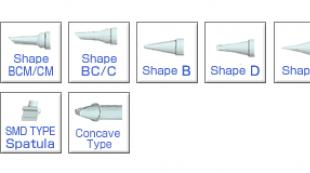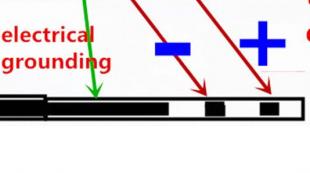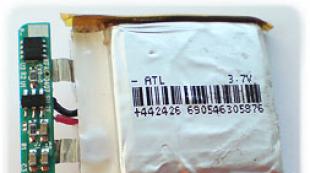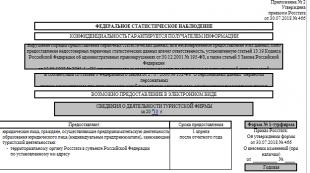Alexander Blok - I enter the dark temples: Verse. "Analysis of the poem "I enter the dark temples ..." from the cycle "Poems about the Beautiful Lady" by Alexander Blok
The poem "I enter dark temples... ". Perception, interpretation, evaluation
The poem "I enter the dark temples ..." was created by A.A. Blok in 1902. It was written under the impression of the poet's meeting with Lyuba Mendeleeva in St. Isaac's Cathedral. The poem was included in the "Cycle of poems about the Beautiful Lady." In his youth, the poet was fascinated philosophy V. Solovyov. According to this teaching, the world, mired in sins, will be saved and reborn to life by a certain Divine principle that embodies the Eternal Feminine. Blok endowed this image with ideal features, gave him various names: the Beautiful Lady, the Majestic Eternal Wife, Kupina. He represented himself as a knight who had taken a vow to serve the Beautiful Lady. As part of these creative searches, this work was created.
Compositionally, the same theme develops in the poem - the hero's wonderful dream, his date with the Beautiful Lady is described. At the beginning of the poem, some signs of reality are given: “dark temples”, “poor rite”. All these images precede the hero's meeting with the Beautiful Lady. And no wonder it happens in the temple. This is a world in which love and harmony, kindness, warmth and perfection always reign. Thus, the image of the heroine in the mind of the lyrical hero is equated with the Divine principle. And gradually the image of the hero also becomes clear to the reader. The second stanza becomes a peculiar culmination of the theme of a date:
In the shadow of a high column Trembling from the creak of doors.
And he looks into my face, illumined,
Only an image, only a dream about Her.
The reader here understands that the Beautiful Lady is only a hero's dream. However, there is no bitterness or regret in his soul. He is completely immersed in his dream, infinitely devoted to it. Reality does not burden him, because it is as if it does not exist in his soul. The hero's world is a world of "smiles, fairy tales and dreams." The main thing is faith in a dream: “I can’t hear any sighs or speeches, But I believe: Sweetheart is You.”
The poet uses here characteristic images and colors: we see the flickering of "red lamps", the golden sheen of icons, the haze of yellow candles. The color palette here is symbolic: the red color speaks of sacrifice, hints at the readiness of the lyrical hero to give his life for the sake of the Beautiful Lady (red color is associated with blood). Yellow and gold, on the contrary, are colors that symbolize life, the sun, warmth. Obviously, the lyrical hero is so merged with his dream that it has become an invariable part of his life.
The poem was written by a dolnik. The poet uses various means of artistic expression: epithets (“dark temples”), metaphor (“Smiles, fairy tales and dreams run high along the cornices”), alliteration (“I tremble from the creak of doors”).
Thus, the work is "programmatic" for Blok's early lyrics. The young poet embodied his myth about the World Soul through allegories, mystical forebodings, mysterious allusions and signs.
Analysis of the poem "I enter the dark temples"
Symbolist A.A. Blok immortalized his name by creating a cycle of poems about the "Beautiful Lady". They contain pure adolescent love for the beautiful, chivalrous humility for the ideal, a dream of sublime love, which was a means for penetrating into higher worlds, for merging with perfect eternal femininity. A cycle of poems about the "Beautiful Lady" is dedicated to the beloved A.A. Blok. Lyubvi Dmitrievna Mendeleeva, who later became his wife. This is a prayer addressed to the Lady of the Universe, the Eternal Wife, a saint. And one of the most penetrating and mysterious poems, I consider the masterpiece "I enter the dark temples."
I enter dark temples
I perform a poor rite
There I am waiting for the Beautiful Lady
In the flickering of red lamps.
The first line of the poem sets the reader on something mystical, otherworldly, inherent in the abode of an unearthly creature, the Beautiful Lady, the Majestic Wife, dressed in white clothes and alien to the whole earthly quagmire.
The lyrical hero considers the ceremony of initiation into the knights of the Beautiful Lady poor in comparison with the richest spirituality of his ideal. The inner state of the lyrical hero is magnificently shown with the help of a figurative detail - red lamps. Red is the color of love and anxiety. The hero loves his ideal, but is anxious before her appearance. Further, the anxiety of the lyrical hero grows ("I'm trembling from the creak of doors ..."), since her image visibly arises in his imagination, a dream about her, illuminated by an aura of holiness, created by Blok himself. The image of the Beautiful Lady is incorporeal, fantastic, but it appears so often in front of the poet that he is already accustomed to contemplating her in divine robes. Her appearance brings calm to the lyrical soul of the hero, he sees smiles around him, hears fairy tales, fairy dreams arise in his imagination. All his senses are open to the inspiration of perception of all that he sees and hears. The lyrical hero finds harmony. He enthusiastically exclaims:
Oh, Holy One, how gentle are the candles,
How pleasing are your features
I can't hear sighs or words
But I believe - Dear You.
Admiration fills the soul of the narrator. The lexical repetition of the amplifying "how" emphasizes the admiration, admiration of the young man - the poet for perfection. The metaphorical epithet "gentle candles" is Blok's real poetic discovery. The hero "can't hear neither sighs nor speeches" of his beloved, disembodied spirit, but contemplating the gratifying features that give joy and peace to the heart, elevate the soul and give inspiration, he believes that she is Darling. An amplifying punctuation mark - a dash - brings down a huge emphasis on the short "you", confirming the indisputability of the poet's ideal. Blok's dream of meeting the Beautiful Lady came down to leaving real world, full of bogs, swamps, "black buildings", "yellow" lights, unworthy people for whom "truth is in wine", in deceiving the weak, defenseless, in profit and self-interest, into an ideal world inhabited by pure creatures close to ideal.
The poem makes a huge impression on the reader with its power of narration, the selfless feelings of the youth - the knight of Blok, the abundance of pictorial expressive means that fully reveal the inner state of the lyrical hero, showing the environment surrounding the poet, and creating that religious, mystical flavor. The text contains many words that have a bright emotional coloring, sublime, church vocabulary (temple, lampada, riza, gratifying), they emphasize the exceptional solemnity and significance of events for the poet. The image of the Beautiful Lady meant a lot to Blok, he idolized her, but later the Muse of Eternal Femininity left him.
Symbolist A.A. Blok immortalized his name by creating a cycle of poems about the "Beautiful Lady". In them - pure adolescent love
to the beautiful, lordly humility of the ideal, the dream of sublime love, which was a means of penetrating into
the higher worlds, to merge with the perfect eternal Femininity. A cycle of poems about the "Beautiful Lady" is dedicated to her beloved
A.A. Blok. Lyubvi Dmitrievna Mendeleeva, who later became his wife. This is a prayer addressed to the Lady
Universe, Eternal Wife, saint. And one of the most penetrating and mysterious poems, I consider the masterpiece "Enter
I'm in the dark temples."
I enter dark temples
I perform a poor rite
There I am waiting for the Beautiful Lady
In the flickering of red lompads.
The first line of the poem sets the reader up for something mystical, otherworldly, inherent in the abode of the unearthly
creature, the Beautiful Lady, the Majestic Wife, dressed in white clothes and alien to the whole earthly quagmire.
The rite of initiation into the knights of the Beautiful Lady, the lyrical hero considers poor in comparison with the richest spirituality of his
ideal. The inner state of the lyrical hero is shown magnificently with the help of a figurative detail - red lamps. Red
- the color of love and anxiety. The hero loves his ideal, but is anxious before her appearance. Further anxiety lyrical
the hero grows ("I'm trembling from the creaking of doors ..."), since in his imagination her image visibly arises, a dream about her,
illuminated by an aura of holiness, created by Blok himself. The image of the Beautiful Lady is incorporeal, fantastic, but it arises in this way
often before the poet that he was already accustomed to contemplating her in divine robes. Her appearance brings into the lyrical soul of the hero
calmness, he sees smiles around him, hears fairy tales, fairy dreams appear in his imagination. All his feelings
open to inspiration of perception of all that he sees and hears. The lyrical hero finds harmony. He enthusiastically
exclaims:
Oh, Holy One, how gentle are the candles,
How pleasing are your features
I can't hear a sigh or a speech
But I believe - Dear You.
Admiration fills the soul of the narrator. The lyxic repetition of the amplifying "how" emphasizes admiration,
admiration of the young man - the poet before perfection. The metaphorical epithet "gentle candles" is a real poetic discovery
Blok. The hero "heard neither sighs nor speeches" of his beloved, incorporeal spirit, but contemplating the gratifying features that give
joy and peace to the heart, elevating the soul and giving inspiration, he believes that she is Darling. Amplifying sign
punctuation - this is a dash - brings down a huge emphasis on the short "you", confirming the indisputability of the poet's ideal. Dream
Blok about meeting with the Beautiful Lady came down to leaving the real world, full of cracks, swamps, "black buildings",
"yellow" lanterns, unworthy people, for whom "truth is in wine", in deception of the weak, defenseless, in profit and self-interest,
into an ideal world inhabited by pure creatures close to the ideal.
The poem makes a huge impression on the reader with its power of narration, the selfless feelings of the lad -
Knight of Blok, an abundance of pictorial expressive means, revealing in full the internal state
lyrical hero, showing the environment surrounding the poet, and creating that religious, mystical flavor. In the text
there are many words that have a bright emotional coloring, sublime, church vocabulary (temple, icon lamp, robe,
gratifying), they emphasize the exceptional solemnity and significance of events for the poet. The image of the Beautiful Lady is very
meant a lot to Blok, he idolized her, but later the Muse of Eternal Femininity left the creator, giving way to pure,
selfless and devoted love for the motherland.
This poem was written when the young Alexander Blok was barely 22 years old. It was this time that the poet himself marked as a period of active creativity, an open spiritual search for his own higher truth and truth. A whole cycle of love poems is dedicated to Lyubov Dmitrievna Mendeleeva. In her face, the poet found a dear friend and muse, whom he served all his life. He idolized this girl, who later became his wife, and saw in her manifestations of the divine essence.
The poetic analysis “I enter the dark temples” is intended to show and designate main feature spiritual quest of Alexander Blok at a particular stage in the development of creativity. Namely, serving the image of the Eternal Feminine, trying to find her in the material world, get closer to her and make an integral and indestructible face a part of one's own existence.
Theme of the poem
“I enter dark temples” is one of the pinnacles of Alexander Blok's poetry in the cycle dedicated to the Beautiful Lady. The key point should be considered an attempt to find a dream, an image of the Eternal Femininity in the ordinary world with the prevailing material values and attitudes. Hence, the moment of discrepancy in ideas, the lack of response, the futility of the search can be clearly traced.

The analysis of “I Enter Dark Temples” shows how the lyrical hero of A. Blok is divorced from reality, absorbed in his own obsession. And it is difficult for him to cope with this mystical desire, it subjugates him, deprives him of his will, common sense, mind.
The state of the lyrical hero
The verse “I enter dark temples” is the eleventh in a row among the works addressed to Lyubov Dmitrievna Mendeleeva. The lyrical hero is in a state of anxiety, he wants to find integrity with himself, to find his lost soul mate - a part of himself, without which he cannot become happy. In a holy place, a temple, he sees only echoes of that mysterious, unearthly image, on which his search is directed, on which all attention is focused. Here the author himself connects with the feelings of the lyrical hero in these deep inner experiences.
Image of the Eternal Feminine
One of the most beautiful and mysterious is the poem "I enter the dark temples." Blok endowed his heroine with fabulous, mystical features. It is elusive in its essence, beautiful and incomprehensible, like a dream itself. This is how the image of Beauty arises as the hypostasis of divine love. Often the lyrical hero compares her with the Mother of God, gives her mystical names. Alexander Blok called her the Dream, the Most Pure Virgin, the Eternally Young, the Lady of the Universe.

Readers have always had rave reviews and impressions after reading such verses as "I enter into dark temples." Blok is a favorite poet of many intellectuals, especially his work is close to young boys and girls. The one whom the lyrical hero serves is shrouded in the greatest mystery. He treats her not as an earthly woman, but as a deity. She is also surrounded by shadows, in which her attraction to the Apollonian beginning is guessed - the hero contemplates her and himself receives feelings from the experience. The analysis of "I Enter the Dark Temples" shows the reader an interesting approach to interpreting the lines known and loved by millions.
Key Symbols
In the poem, several images can be distinguished that create a kind of background for the development of the action, complement the plot with vivid pictures.
The robes emphasize the holiness and sublimity of the image of the Beautiful Lady. This is the material embodiment of the divine principle (Virgin Mary, church). Everything earthly is alien to her, she is a sublime element of freedom and light. You can pray to her at night in the moonlight, singing unsurpassed beauty with every thought and action.

Red lamps symbolize the unattainability of a dream, its remoteness and unreality, compared to everyday life. This is where the fictional world meets reality.
Thus, the analysis of “I Enter the Dark Temples” emphasizes the idea that the intimate and personal experiences of youth occurred in the poet against the background of the desire to unravel the mystery of Beauty.
“I enter dark temples…” Alexander Blok
I enter dark temples
I perform a poor ritual.
There I am waiting for the Beautiful Lady
In the flickering of red lamps.In the shadow of a tall column
I tremble at the creak of doors.
And he looks into my face, illumined,
Only an image, only a dream about Her.Oh I'm used to these robes
Majestic Eternal Wife!
Run high on the ledges
Smiles, fairy tales and dreams.Oh, Holy One, how gentle are the candles,
How pleasing are Your features!
I hear neither sighs nor speeches,
But I believe: Honey - You.
Analysis of Blok's poem "I Enter Dark Temples..."
Love lyrics in the work of Alexander Blok are of key importance. And this is not surprising, since the 17-year-old poet, who experienced strong feelings for Lyubov Mendeleeva, managed to keep them for life. This woman was destined to become Blok's muse and his guardian angel. Even after fate separated this couple, the poet continued to love his ex-wife, helped her in every possible way and sincerely believed that they were made for each other.
For the first time, the image of Lyubov Mendeleeva appeared in the poet's poems dated to the last year of the 19th century. This period of creativity includes the creation of a cycle of works dedicated to the mysterious beautiful lady. Her prototype was the chosen one of the poet, who for a long time did not reciprocate his feelings. As a result, the young people broke up and did not see each other for several years, during which Blok recreated a cute image in his works with enviable regularity. The eyes, smile and even the voice of Lyubov Mendeleeva followed the poet everywhere. Blok even admitted that it looks like some kind of insanity when you try to find a familiar figure in a crowd of people, you notice a similar head tilt and even a manner of carrying a handbag in completely strange young ladies.
The poet did not tell anyone about his emotional experiences, however, what he felt after parting with the chosen one can be easily read between the lines of his works. One of them is the poem "I enter the dark temples ...", created in 1902. Its essence is that even in the image of the Mother of God, the poet seems to be beloved, and this fills his soul with double joy. It is difficult to judge how much everything written corresponded to reality, however, the acquaintances of the young Blok claim that at some point he became truly devout and rarely missed Sunday service. It can be assumed that with the help of prayer, the poet tried to drown out his mental pain and come to terms with the loss of a loved one. However, the author himself explains this behavior in a slightly different way, noting: "there I am waiting for the Beautiful Lady in the flickering of red lamps."
It would be foolish to count on the fact that it is in the temple that Blok will meet his pragmatic and freed from religious prejudices beloved. The poet understands this very well, but continues to visit the church. There, “an illumined one looks into my face, only an image, only a dream about Her.” Now there is no doubt that in the images of the “Magnificent Eternal Wife” the poet sees the features of the girl he is in love with. And this similarity fills Blok's soul with inexplicable joy, he believes that his love is a gift from heaven, and not a curse. And such an interpretation of such a strong feeling makes Blok not give it up, but, on the contrary, cultivate love in his heart, which gives him the strength to live. “I can’t hear any sighs or speeches, but I believe: Sweetheart is You,” the poet admits.
The romantic period in Blok's work, associated with the creation of the cycle "Poems about the Beautiful Lady", did not pass without a trace for the poet. Until his death, he was very respectful of women, considering them higher beings, more refined and vulnerable. As for Lyubov Mendeleeva, he truly idolized her and was even a little afraid that with his own feelings, rude and primitive, he could denigrate the soul of the one he loves so much. However, as practice shows, not every woman can appreciate such a reverent attitude towards herself. Lyubov Mendeleev was no exception in this regard, since she betrayed Blok more than once, falling in love with other men. However, after the death of the poet, she admitted that she was unfair to him and could not fully understand what kind of noble and sublime nature her husband possessed.









